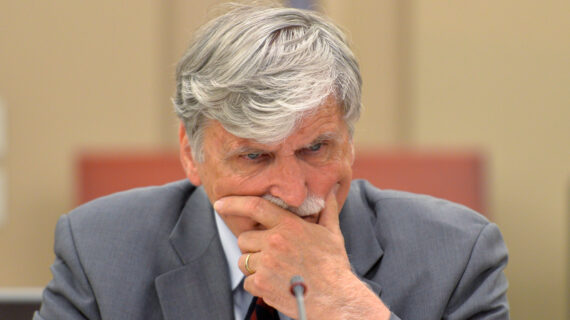The saintly editors here at The Hub have agreed to my request to produce one of my two monthly articles for the site as a monthly transatlantic diary. For those readers not familiar with the format, which is more common in British journalism, the diary is a grab bag of short items, sometimes on a common theme, but often not. In my case, what they have in common is that they are either too inconsequential to merit a full article or I can’t be bothered to come up with more than a knee-jerk reaction or a flip comment. This is April.
“To what purpose, April, do you return again?” So begins what must be the most dyspeptic poem ever written about the arrival of spring.
I find it impossible to separate Edna St. Vincent Millay from her old house at 75 ½ Bedford St in Greenwich Village, which I used to pass almost daily when I lived a few streets over. Who wouldn’t wonder fondly about someone who lived in such a perfect little doll’s townhouse? Millay seems to be one of those giants of an age who is destined to be an asterisk to posterity, with fewer poems included in each successive edition of anthologies of American literature. Her eccentric name and equally eccentric life have probably earned her a longer academic afterlife than many of her peers (be honest, when was the last time you read Margaret Widdemer or Lady Speyer?), but I hope at least a few people still actually read her poems.
The poem ends:
“April
Comes like an idiot, babbling and strewing flowers.”
Readers will note that for this diary entry I have followed the month’s example, minus the flowers.
* * *
Speaking of spring poetry, Browning must have been unusually homesick in Northern Italy when he wrote “Oh, to be in England / Now that April’s there,” because I was in Milan and Lake Como this month and I can assure you it never once occurred to me to wish myself anywhere else. If I had one complaint, it was the same one I have every time I travel to anywhere beautiful these days: the aural vandalism of canned music. In every bar, cafe, or park concession stand one is assaulted by vacuous pop music. It is the soundtrack to our modern lives.
We have the same problem in North America, of course, where it is almost impossible to find music-free urban spaces, but a blaring dance-hall remix is even more jarring on a Florentine piazza or in a Milanese park. I’ve tried to ask managers why they broadcast such violative noise, but they just shrug as though I’d asked why the sun shines. I doubt they even notice it’s on. Would anyone notice if they turned it off? I doubt it, considering half the patrons are lost in their own private headphone worlds. And on the rare and blessed occasions when the music stops, I’ve never once seen people remark on it, let alone complain. If I could impose one simple rule on the modern world it would be this: unless there’s a dance floor, turn off the tinned music.
* * *
Sticking with the subject of old-world habits, is smoking making a comeback? Before leaving for Italy, I attended a soirée honouring a currently controversial author hosted by a rebelliously erudite young couple. To say their Oxford home was exquisitely appointed doesn’t begin to do it or them justice—you’ll get a sense of what I mean when I say that the small first-floor living room displayed a painting by each of the major pre-Raphaelites (“except Millais, Millais is downstairs”). What was unusual—even more unusual, that is, than the genuinely fearless conversation—was that it was the first gathering in a private home I can remember in at least two decades at which people smoked indoors. The hosts, as well as several of the guests, were just lighting up, unapologetically, like it was 1975.
While I’ve never been a smoker, and haven’t the faintest desire to take it up, I must say it gave the evening a delightfully retro feel. And while I am sure the decline of smoking is on the whole a Good Thing, I was strangely glad to see it. As a friend who is an ex-smoker wrote afterwards:
Smoking made everything more fun. People were sexier and skinnier when they smoked, too. I’ve always thought that smoking had tremendous social utility as well due to nicotine’s power to aid in concentration and focus. Can you imagine the Apollo program quants, those evil, sinister white men with the crew cuts and the white shirts and the skinny black ties, getting our boys to the moon without chain smoking? (I’m sure the “Hidden Figures” ladies smoked too—everyone smoked!)
I can’t disagree. And apparently I’m not alone: the New York Post reports that coffin nails are the new taboo-flouting trend of New York’s Gen Z It crowd, though from the photos I’d say cigarettes are the least of their problems.

* * *
I recently reviewed Michael Bonner’s new book for this site. As with any review, I could only include a small fraction of what I wanted to say. One thing I cut was a digressive riposte to Bonner’s passing deprecation of the Baroque (on pages 126 and 138). I wholly agree that the worst excesses of the rococo are as inhuman in their own way as Brutalism is, well, brutal, but all that says is that the bad examples of a style are bad. I felt this way about the fussy façade of Milan’s Cathedral, where the flamboyant gothic overwhelms the senses by sheer size rather than taste. Unsurprisingly, Mark Twain (who was usually wrong about things, but cleverly so) loved it, but both Ruskin and Wilde, who were rather more familiar with the distinction between excellence and excess, did not.
At its best, the Baroque is a virtuosic duet between nature and artifice. Creation may be intrinsically ordered, but it can also be dazzlingly ostentatious, and the Baroque is a joyous human homage to the God who adorns the symmetry of creation with cresting waves and floral profusion. At the Pinocateca di Brera, a short walk from the cathedral, I could say with assurance that I would not wish one paint stroke less of Rubens’s art in this world. You simply cannot be cold about Caravaggio. As for the candyfloss excesses of a Fragonard, Boucher, or Watteau, while I wouldn’t want them in my home, they’d be an happily effulgent “eff you” hung on the walls of an antiseptic modern office building.
* * *
Tying together two themes of this month’s diary, I’ll end on an Anglo-Italian note. An uncommonly persistent stomach bug meant I had to turn down an invitation to an event in London with the new Italian Prime Minister Giorgia Meloni. Despite being subjected to the kind of ominous hysteria that the Western press reserve for politicians who dare to be openly patriotic or religious, signora Meloni cruised to victory last year and is even more popular today than when she was elected. Whether she remains so will depend on her convincing other European leaders to take seriously the problem of illegal migration. And it really is a problem. More than 100,000 illegal migrants arrived in Italy last year, and if the tottering Tunisian regime falls, the number this year could be closer to a million, with more to follow every year, indefinitely.
The daily arrival of so-called “small boats” on the south coast of England also happens to be one of the biggest issues in British politics as well, which is why Meloni was in town to enlist the support of U.K. Prime Minister Rishi Sunak. Last year at least 45,000 illegal migrants arrived in the U.K., almost all from France, which is a little more than the number who crossed into Canada at Roxham Road in 2022. Like those crossing the Canadian border (in both directions, note), the Channel crossers are all coming from safe Western countries. Of course, most aren’t facing persecution in their own countries either, just dysfunctional politics, which is not grounds for asylum. Sunak knows that his migration problem is downstream of Italy’s, so he has good reason to back Meloni’s resolve. So far, at least, that is what he has done, while the progressive press wails. Let them wail.




